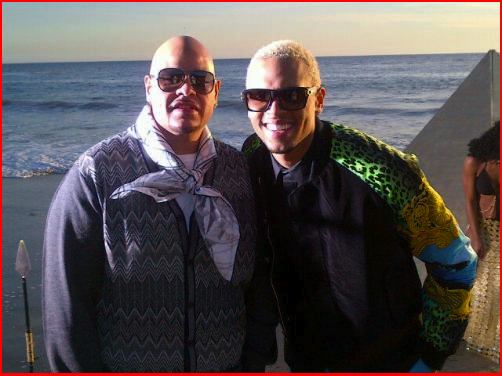Fat Joe Calls for Recognition of Chris Brown’s Talent Amidst Controversy

In a recent video statement, rapper Fat Joe sparked controversy and debate by advocating for greater recognition of Chris Brown’s musical talent, despite Brown’s tumultuous past involving the assault of Rihanna over a decade ago. Fat Joe’s impassioned plea has reignited discussions about forgiveness, redemption, and the impact of personal actions on public perception within the entertainment industry.
Chris Brown, renowned for his exceptional singing, dancing, and songwriting abilities, has been a polarizing figure in the music industry since the highly publicized incident with Rihanna in 2009. The incident resulted in legal repercussions and significantly tarnished Brown’s reputation, overshadowing his artistic achievements for many.
Fat Joe’s statement, delivered via social media, challenges the prevailing narrative surrounding Chris Brown. “If Chris Brown never got into the controversy with Rihanna, we would be calling him Michael Jackson right now,” Fat Joe declared, emphasizing Brown’s unparalleled talent as a singer, artist, performer, and hitmaker in contemporary music.
:quality(70)/cloudfront-us-east-1.images.arcpublishing.com/cmg/DOYTCIED4ZWUWPZ5IU5B4SUOFI.jpg)
Indeed, Chris Brown’s musical career has been marked by numerous achievements. He burst onto the scene as a teenage sensation with his debut album and quickly established himself as a force to be reckoned with in the R&B and pop genres. His dynamic performances, intricate dance routines, and chart-topping hits have earned him a dedicated fanbase and critical acclaim.
Despite his undeniable talent, Chris Brown’s career has been marred by ongoing scrutiny and skepticism from both the media and the public. The incident with Rihanna remains a defining moment in his career, shaping perceptions and casting a long shadow over his professional accomplishments.
Fat Joe’s advocacy for recognizing Chris Brown’s talent despite past controversies has sparked mixed reactions. Supporters argue that Brown has paid his dues and deserves acknowledgment for his musical contributions and evolution as an artist over the years. They contend that focusing solely on past mistakes overlooks Brown’s growth and artistic maturity.
Conversely, critics maintain that the severity of Chris Brown’s actions cannot be overlooked or forgiven simply based on his musical prowess. They argue that accountability and consequences are integral to addressing issues of violence and promoting a culture of respect and safety, particularly in the entertainment industry.

The debate surrounding Chris Brown’s legacy reflects broader societal conversations about redemption, forgiveness, and second chances. In recent years, public attitudes towards celebrities embroiled in controversy have evolved, with calls for a more nuanced understanding of personal growth and rehabilitation.
In response to Fat Joe’s video statement, some fans and industry figures have echoed his sentiments, expressing a desire to focus on Chris Brown’s artistic achievements rather than his past missteps. They highlight the need for empathy and understanding in evaluating complex personal histories within the context of public figures’ careers.
Meanwhile, others remain steadfast in their belief that accountability should precede any considerations of talent or professional accolades. They emphasize the importance of addressing issues of violence and ensuring that victims are heard and supported, regardless of a perpetrator’s public profile.
As the discourse continues, Chris Brown’s journey in the music industry serves as a poignant reminder of the complexities of fame, talent, and personal responsibility. Whether his legacy will ultimately be defined by his musical achievements or overshadowed by past controversies remains a subject of ongoing debate and reflection within both the entertainment industry and society at large.
Fat Joe’s vocal support for Chris Brown underscores the ongoing tension between acknowledging talent and holding individuals accountable for their actions. As the music industry grapples with these issues, the conversation around Chris Brown’s legacy serves as a catalyst for broader discussions about the intersection of artistry, personal conduct, and public perception in contemporary culture.
News
Whoopi Goldberg Ejected from “The View” After Defending Megan Rapinoe
In a dramatic and unexpected development, Whoopi Goldberg, a co-host of “The View,” was abruptly removed from the show after vocally supporting Megan Rapinoe during a heated discussion. Goldberg, renowned for her candid and forthright commentary, passionately defended Rapinoe amid…
Riley Gaines Awarded “Woman of the Year” Over Megan Rapinoe
Riley Gaines Awarded “Woman of the Year”: A Controversial Decision In a surprising turn of events, Riley Gaines, a distinguished collegiate swimmer, has been awarded the prestigious “Woman of the Year” title, surpassing the well-known soccer star Megan Rapinoe. This…
WNBA Opens Investigation: Star Caitlin Clark Was “Played Unfairly”?
WNBA Opens Investigation: Star Caitlin Clark Was “Played Unfairly”? In a surprising and significant move, the Women’s National Basketball Association (WNBA) has announced an official investigation into claims that star player Caitlin Clark was “played unfairly” in recent games. This…
Surprise! NCAA strips Lia Thomas of her medal and gives it to Riley Gaines?
In a groundbreaking and decisive move, the National Collegiate Athletic Association (NCAA) announced the complete transfer of all medals awarded to Lia Thomas to fellow swimmer Riley Gaines. This unprecedented decision marks a significant shift in the ongoing discourse surrounding…
Toni Braxton EXPOSES Why She Could Never Marry Birdman
Toni Braxton Calls it Quits: Birdman’s Alleged Secret Life Leads to Breakup Toni Braxton fans were shocked earlier this year when news broke of her split from rapper Birdman. While rumors of a fairytale wedding had swirled for years, Braxton…
Diddy Is FINISHED After SHOCKING Videos Expose Him With Justin Bieber and Jaden Smith
Diddy Hit With Shocking Allegations: Mentor or Manipulator? Sean Combs, better known as Diddy, is no stranger to controversy. However, recent rumors swirling around his past mentorship of Justin Bieber and Jaden Smith have taken things to a new level….
End of content
No more pages to load











